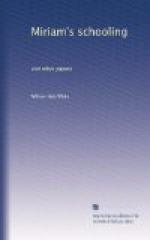After some negotiation, therefore, Miriam and Andrew departed for London, the salary being fixed at thirty-eight shillings a week. To this Giacomo added twelve shillings a week—two pounds ten shillings altogether. It was a happy day for both of them when they journeyed to the end of Cowfold Lane, and waited for the coach; they were happier still when they were mounted on the top, and were at last on the great London road, and already on the line which, was in direct communication with the great city. It was different altogether from the Cowfold roads, and there was a metropolitan air about it. They continually met coaches going away to York, Newcastle, and even to Edinburgh, and the drivers mutely saluted by lifting their whips as they passed. Two drivers had thus met for forty years, and had never spoken a single word to one another. At last one died, and the other took his death so much to heart that he sickened and died too. The inns were nothing like the Cowfold inns. They were huge places, with stables like barracks, and outside each of them were relays of beautiful horses standing ready for the change. The scenery from Huntingdon to London is not particularly attractive, but to Miriam and Andrew the Alps could not have been more fascinating. They wondered that others did not share their excitement, and Andrew thought that a coachman must be the happiest of men.
At last they reached Barnet, the last stage, and immediately afterwards they saw the line of the smoke-cloud which lay over the goal of all their aspirations, the promised land in which nothing but golden romance awaited them. Presently a waypost was passed, with the words To the West End upon it, so that they might now be fairly said to be at least in a suburb. Ten minutes more brought them to Highgate Archway, and there, with its dome just emerging above the fog, was St. Paul’s! They could hardly restrain themselves, and Miriam squeezed Andrew’s hand in ecstasy. They rattled on through Islington, and made their first halt at the “Angel,” astonished and speechless at the crowds of people, at the shops, and most of all at the infinity of streets branching off in all directions. Dingy Clerkenwell and Aldersgate Street were gilded with a plentiful and radiant deposit of that precious metal of which healthy youth has such an infinite store—actual metal, not the “delusive ray” by any means, for it is the most real thing in existence, more real than the bullion forks and spoons which we buy later on, when we feel we can afford them, and far more real than the silver tea-service with which, still later, we are presented amidst cheers by our admiring friends in the ward which we represent in the Common Council, for our increasing efforts to uphold their interests.




